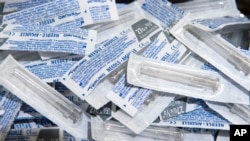Four years after marijuana use was legalized nationwide, political momentum is growing in Canada for the decriminalization of most other illicit drugs.
Negotiations with the federal health ministry are progressing on an application from the province of British Columbia for an exemption from the Controlled Drugs and Substances Act. The exemption would legalize possession of up to 4.5 grams of opioids, cocaine and methamphetamine.
Similar requests are being considered by the Board of Health in the city of Hamilton, Ontario, and the Board of Police Commissioners in Saskatoon, Saskatchewan. A bill introduced by a member of the left-leaning New Democratic Party is expected to be discussed in the federal parliament this year.
City councilors in Edmonton, Alberta, voted unanimously to apply for such an exemption just hours before a visit to the city by Prime Minister Justin Trudeau earlier this month.
Trudeau 'extremely worried'
"The reality is here in Alberta we've seen far too many tragedies around the opioid epidemic," Trudeau was quoted as saying during the visit. "I had a great conversation with Mayor [Amarjeet] Sohi about it last night when I got into town, and I can tell you that he and all of us are extremely worried about what Albertans are going through on the opioid epidemic."
While stopping short of endorsing the requested exemption, Trudeau was quoted by the CTV television network as saying his government "will welcome their application when it comes in. … We're already working with the government of British Columbia on a similar issue, and we're going to make sure we're grounded in science, grounded in supporting people."
The opioid crisis, which has swept across Canada much as it has the United States, is the biggest factor driving the move to legalize illicit drugs. A federal government study released last month reported a 95% increase in apparent opioid toxicity deaths in the 12 months ending in March 2021 compared with the previous 12 months.
Almost 23,000 Canadians died of opioid toxicity between January 2016 and March 2021.
"A good way of thinking about it is that the illicit drug supply in Canada is unpredictable and dangerous. Highly potent drugs like fentanyl and carfentanil are rampant in the drug supply," said Jordan Westfall, co-founder of the Canadian Association for Safe Supply, one of the top drug advocacy organizations.
"Safe supply provides people at risk of overdose an alternative to that danger and risk of overdose," he said in an interview. "A person never has to worry that their next sip of store-bought alcohol could kill them. People buying illicit drugs on the street do not have that protection, hence providing a safe supply."
The approach is in keeping with long-existing policies in Canada, where "harm reduction" has often been emphasized over outright prohibition. Canadian jurisdictions are far more likely than their American counterparts to promote policies such as safe injection sites and needle exchanges. Canada is one of only six countries to have legalized the recreational use of marijuana.
But the latest initiative is not without critics.
Shaun Wright, superintendent of the Royal Canadian Mounted Police in Prince George, British Columbia, was quoted on a local website saying he believes the provincial application, if approved, "is just going to make these issues of social disorder increase exponentially, is my personal opinion. And I think the manner in which it's proposed is a terrible idea."
Wright added: "I believe it's 4½ grams of fentanyl is what's been proposed that anybody can walk around with, and that's enough to kill many people, so I don't know why any government would propose that that's a good idea."
4.5-gram threshold too high?
Syd Lecky, the RCMP superintendent in Kamloops, another British Columbia city, told the city council late last month that he supports decriminalization but believes the 4.5-gram threshold proposed by the province is much too high.
"Four and a half grams is an incredible amount," Lecky told the council, according to a local website. Asked by reporters afterward what amount he would like to see, he said, "It would be far less. … Who knows where that number, why they settled on that number. I just know it's not the right number."
The health ministry was reported this month to be considering a lower threshold of 2.5 grams. But advocates of decriminalization argue that would simply put users at greater risk by driving them into the illegal drug market more often.
While the reconsideration of drug laws is principally driven by the opioid crisis, interest is growing in the legalization of psychedelic drugs, especially for therapeutic purposes.
'Use of psychedelics' on the rise
"We have the increasing use of psychedelics in medicine, and palliative care in particular," said University of Toronto professor Akwasi Owusu-Bempah, one of Canada's most respected experts on drug policy reform.
"We've recently seen a psychedelics industry born and now have numerous companies listed on our public exchanges," he told VOA.
Owusu-Bempah added that the reconsideration of Canada's drug laws is being driven in part by a growing recognition that those laws have been unevenly enforced.
"We also have increasing attention in this country to racial disparities in drug law enforcement, and the consequences or implications that this has, not only for the people directly affected and the communities they come from, but for our society as a whole," Owusu-Bempah said.
"As these forces continue to gain momentum and increasingly converge, lawmakers will have little choice but to act."




